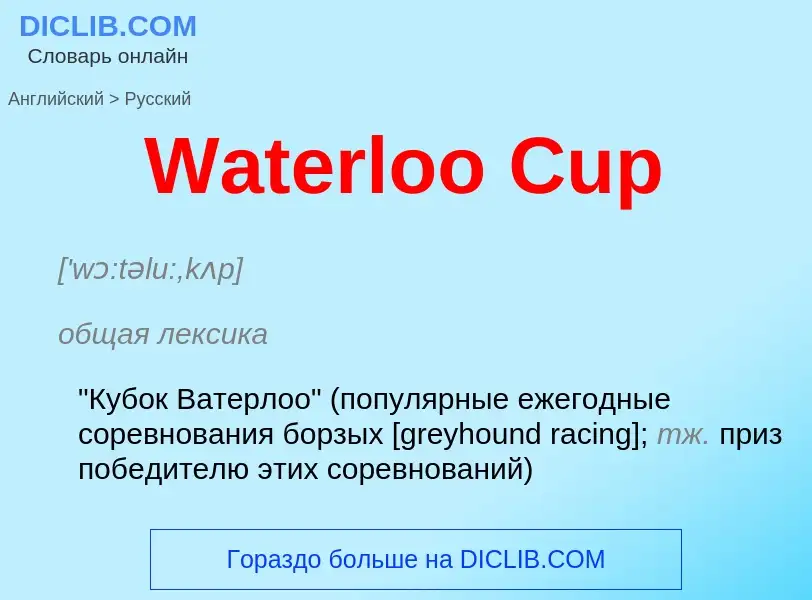Translation and analysis of words by ChatGPT artificial intelligence
On this page you can get a detailed analysis of a word or phrase, produced by the best artificial intelligence technology to date:
- how the word is used
- frequency of use
- it is used more often in oral or written speech
- word translation options
- usage examples (several phrases with translation)
- etymology
Waterloo Cup - translation to English
['wɔ:təlu:,kʌp]
общая лексика
"Кубок Ватерлоо" (популярные ежегодные соревнования борзых [greyhound racing]; тж. приз победителю этих соревнований)
по названию гостиницы "Ватерлоо" [Waterloo Hotel] в Ливерпуле, принадлежавшей организатору первых подобных состязаний в 1836
[,wɔ:tə'lu:]
общая лексика
Ватерлоо (лондонский вокзал; конечная станция для поездов, обслуживающих запад Великобритании; тж. пересадочный узел метро)
существительное
общая лексика
Ватерлоо
география
Ватерлоо (Бельгия)
г. Уотерлу (США)
сражение у Ватерлоо
последняя
решающая битва
разгром
Definition
Wikipedia

The Waterloo Cup was a coursing event organised by the National Coursing Club. The three-day event was run annually at Great Altcar in Lancashire, England from 1836 to 2005 and it used to attract tens of thousands of spectators to watch and gamble on the coursing matches. It was founded by The 2nd Earl of Sefton and, originally, was supported by his patronage.
It was the biggest annual hare coursing event in the United Kingdom and was often referred to by its supporters as the blue riband event of the coursing year. A hare coursing event of identical name was held in Australia from 1868 to 1985, at which point it became a lure coursing event.
Run as a knock-out tournament between sixty four coursing greyhounds from Great Britain and Ireland, supporters described it as the ultimate test of a greyhound but opponents of hare coursing, such as the League Against Cruel Sports, saw it as a celebration of cruelty. The Hunting Act 2004, which came into force just after the 2005 cup, made hare coursing events illegal in England and Wales, and the Waterloo Cup has not taken place since.



